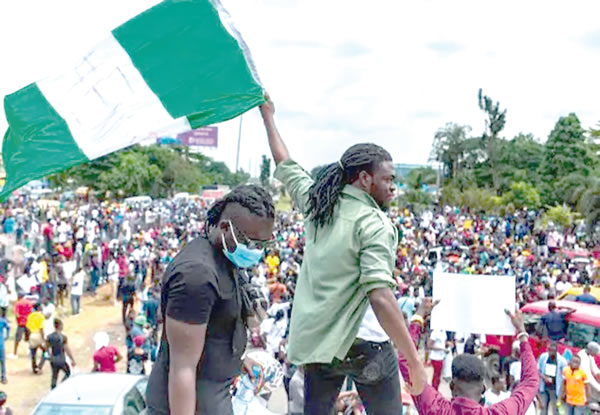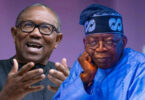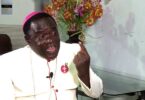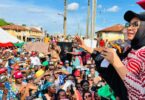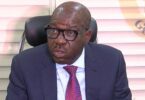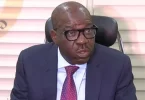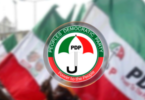With the thick fog in the plain over the planned protest by the youth over economic crisis facing the populace, KUNLE ODEREMI writes on the hide and seek between the authorities and those said to be behind the plan.
“Two cheers for democracy one because it admits variety and two because it permits criticism. Two cheers are quite enough: There is no occasion to give three.” Edward Morgan Forster, an English author.
THE country is apparently on edge over the plan by the youth to embark on a 10-day protest over the economic hardship in the country. The last few days have been characterised by intense propaganda and brinkmanship by top functionaries of the Federal Government and state governors to douse the burgeoning tension with about four days to the August 1 date for the beginning of the protests, which has apparently pitted the government against those who are favourably disposed to the plan of the youth. However, both camps agree that the beauty of civil rule is the guarantee of the rights of the citizens to freely express their views once such opinions are within the ambit of the law. Their point of departure is the modus operandi of the protest, given the political temperature of the country, fragile economic environment and shaky security.
Nigerian Constitution on protest
The right of the citizens to hold peaceful protest is guaranteed under Chapter 4, section 40 of the 1999 Constitution (as amended). It states that, “Every person shall be entitled to assemble freely and associate with other persons, and in particular he may form or belong to any political party, trade union or any other association for the protection of his interests; provided that the provisions of this section shall not derogate from the powers conferred by this constitution on the Independent National Electoral Commission with respect to political parties to which the Commission does not accord recognition.” The rights to hold a public protest is also allowed under the international legal and constitutional frameworks and Nigeria is a signatories to all major international conventions and charter. The way and manner it honours and respects the sanctity of those statutes or otherwise is being closely watched and monitored by those world and regional bodies through appropriate mechanisms.
Pressure groups
Elections do not mark the end of a seamless political process. The due process cuts across other phases that culminate in the conduct of election after which a winner is announced by the electoral body as provided under the constitution and the Electoral Act. The citizens have the duty of putting those they gave their mandate to govern on their feet and constantly give account of their stewardship. They do this by aggregating under pressure groups with the aim of keeping the elected under scrutiny as well as influence government policy decision and legislation. Members of the group will jointly make available their professional savvy and background to insist on transparency, accountability and prudence. Sometimes, the demand could be by way of protest as enshrined in the law.
History of protests
From the colonial era till date, the country has recorded a flurry of demonstrations, protests and other forms of agitations against the establishment. A few of such protests in recent history were the 1989 public fury over the Structural Adjustment Programme (SAP), with a dose of economic belt-tightening under the military. The resistance aborted a plan by the government to obtain a world Bank loan. Till today, the sad memory of the protracted June 12 protests against the military regime that annulled a free and fair presidential poll lingers. There were major casualties in protests at other times, but the scars of the #EndSARs of 2020 constitute the source of apprehension. The phobia in the government circles perhaps informed the position of the like of a Senior Advocate of Nigeria (SAN), Mr Femi Falana, calling on the Federal Government to dialogue with the leaders of the planned protest. “This time round, the government should try to identify the leaders of the movement and then engage them, and then the questions be raised,” said Falana.
The governors and traditional leaders, as well as other leaders of thought have canvassed that the youth back down on the proposed protest as some states are still reeling under the yoke of the 2020 experience.
However, while prominent members of the opposition parties, especially the Peoples Democratic Party (PDP) said the youth were only poised to exercise their inalienable rights under the law, the minority caucus in the House of Representatives is averse to the planned protest because of the vulnerability of the political environment. The lawmakers acquiesce to the use of dialogue to resolve issues agitating the minds of those behind the plan. “We also appealed to the government to dialogue with the planned protesters and also look at some of the messages they are raising, the critical areas that need government intervention,” Honourable Kingsley Chinda said on behalf of his colleagues. “Government should intervene and ensure that issues are resolved amicably. We are not going to encourage any protesters because in the past, we have observed in most cases that even peaceful protests have been overtaken by hoodlums and with the insecurity situation in some parts of the country, you may not have control of the gathering of people.
“Some unscrupulous people may use the opportunity to create chaos. So, we are discouraging any protest but we appeal to government to dialogue and also look at critical areas that are necessary and address them amicably. We acknowledge and observe the insecurity situation in the country and we call on the government to use carrot and stick by ensuring that the results are seen. Let all the security chiefs do what is right to ensure that Nigerians are protected..,” Chinda had said.
Baited breadth
Events in the next couple of days hold the key in terms of where the pendulum will swing over the proposed 10-day protest by the youth. This is because both the federal and state governments have been blowing hot and cold following the intention of those behind the protest to go ahead with their plan. The leaderships of the security architecture have equally vowed to stick to their rules of engagement towards maintaining law and order. While the security services said they have so far identified the sponsors of the planned protest and the source of funding, many observers claim that the real face of those spearheading the agitation remains a mystery, unlike in the past when rights and pro-democracy activists and professional bodies such as the Nigerian Bar Association (NBA) and the Nigerian Medical Association (NMA), workers union in the oil and gas sector formed the arrowheads of protest against certain contentious government policies. Recall that some prodemocracy and rights groups that led public demonstrations at various times included the United Action for Democracy (UAD), United Democratic Alliance (UDA), Democratic Alternative (AD), Civil Liberties Organisation (CLO) and Campaign for Democracy (CD). Though some of the groups still exist, their activities seemed to have ebbed after the restoration of civil rule in May 1999. They have yielded the entire political space to the politicians, whose actions and inactions have led the country to its current state of inertia and stupor.
Posers
One of the nation’s leading constitutional lawyer and activists is Dr Olatunji Abayomi. He fought gallantly when Nigerians resisted the June 12 annulment by the Babangida regime in 1993. He was also counsel for former President Olusegun Obasanjo in the past. Dr Abayomi raised teasers on the state of the Nigeria as a geographical entity, expectations of Nigerians from their country and under what arrangement. He raised the posers against the backdrop of the unending struggle by the country to attain national unity and cohesion, as well as guarantee the growth and development. He declared: “What exactly do we want from Nigeria? What do we expect from her? What should our perspective of her place in the world be? What should be the framework of her government? How do we secure the rights of her people? How do we promote her growth?”
Those teasers are still relevant given the circumstance the country has continued to find itself in. Basic issues of existence stare the citizens in the face. And the words of the legendary legal luminary, Justice Chukwudifu Oputa (SAN) on the irony and affliction Nigeria represents still resonate with the people. This is in spite of the country’s huge human and natural endowments, coupled with its feeble choice to the ideals of democratic governance, years after Justice Chukwudifu Oputa passed on. He had identified the five pyramids of power to include economic or money power; political power; idea power, religious power and the bureaucracy of service power pyramids. According to him, all these pyramids have the same base, which is the mass of ordinary men and women, otherwise called the common man. “These have little or no power, and these do not participate in making the vital decision that affects gradually become marginalized,” the inimitable jurist asserted.
Many other statesmen are concerned that a lot of the politicians are hardly altruistic in their agenda while seeking the mandate of the electorate. They argued that perhaps, the country would have been a better place if the ruling elite that have held the reins of power for decades after Nigeria’s independence had embraced and upheld suggestions unsolicited from other major stakeholders in the Nigerian project. With some major political actors and gladiators perceiving electoral contest as a battle that must be won either by hook or crook, a foremost traditional ruler, Oba Adedapo Tejuoso, the Osile Oke-Ona Egba, Ogun State, had cautioned against such attitudinal disposition. He said: “When you win an election, you have been given a platform to change the lives of fellow men and women for good. This becomes a man’s greatest opportunity in life. Real success is not what a man or woman possesses but what others are blessed with through him or her. This elevated position you now have gives you the opportunity to be a channel of blessing. Use it for its purpose and your generation will forever reap the fruits.
“Winning the election is winning the battle, but lifting the people’s standard of living is winning the war. Always remember you have not won until you have implemented all your rosy promises to the people, otherwise, your present success will be the reason for your future failure.”
Frayed nerves
The government and notable persons and associations have pleaded for more time and patience to end economic hardships as citizens. Rising cost of living, runaway inflation, weak governance system at the state level and poverty and employment are some of the issues that have come to the fore in the debate over the planned protest. The country is battling 34.2 percent inflation, following the spiraling effects of petrol subsidy and sharply devalued naira. The grouses of the agitators are gleaned from social media who have been mobilising against bad governance and economic hardship. But the police and the Minister of Information, Mohammed Idris, have been upbeat in the bid to dissuade those behind the plan. “The president is listening and he has a message to Nigerians and that message is that we must all calm down; they should please cooperate and give the government more time. Everything that they have asked for, all their pleas will be answered,” Idris said.
Global concern
There was serious concern of the international community over the proposed protest by the youths. Their worries stem from the strategic position of Nigeria in the West African sub-region, coupled with its huge human population. In its report on the 2020 public protest in Nigeria, the United States Institute for Peace, in a piece etitled: Protests Test Nigeria’s Democracy and its Leadership in Africa, asserted that the country was beset with “a fundamental crisis of governance that reflects a rising set of demands among its young generation”. It added that the government’s response is certain to resonate across the continent. According to the institute, “With 200 million people, a growing population expected to exceed that of the United States by 2050, Nigeria is the undisputed regional hegemon and has been the decisive force behind the regional bloc, the Economic Community of West African States (ECOWAS).”
Therefore, it offered suggestions on the way forward. The body said: “Nigeria’s leaders should now see the popular demands for accountable and responsible governance—and a real, rather than superficial, overhaul of the security sector—as an opportunity to make meaningful reforms.”
Networking and lobbying
Election is just a step in the journey in a democracy hence such issues like networking and lobbying by groups to make sure that those who got public mandate remain on track on their pre-election promises and party manifesto is crucial. Those that should play the role of watchdog are not the traditional media alone; pressure groups form part of the agents of oversight and independent observers. They are required to keep an eagle-eye on possible infractions and breach of the oath of office sworn to by president, lawmakers, governors, as well as member of the judicial arm of government. The collaboration among pressure groups, civil society groups, will ensure strategic synergy on lobbying and networking to guarantee that the citizens are not shortchanged by public officials.
The need for effective and focused collaboration is stressed by the late Jamaican author and teacher, Dr Patrick Wilmot, who accused the political elite of giving priority to their personal empires at the expense of the welfare of the people. His words: “Many Nigerian politicians, especially those with a military background possess modern farms where they raise livestock. They provide nutritious food, clean water, sanitary housing, the latest medicine and the best sanitary services. They have interest in the welfare of their animal because they want to make profits. If they have the same interest in their citizens, Nigeria would be a far better place and 70 percent of the population would not be classified as dirt poor.”
READ ALSO: CAN youth wing distances self from planned protest

